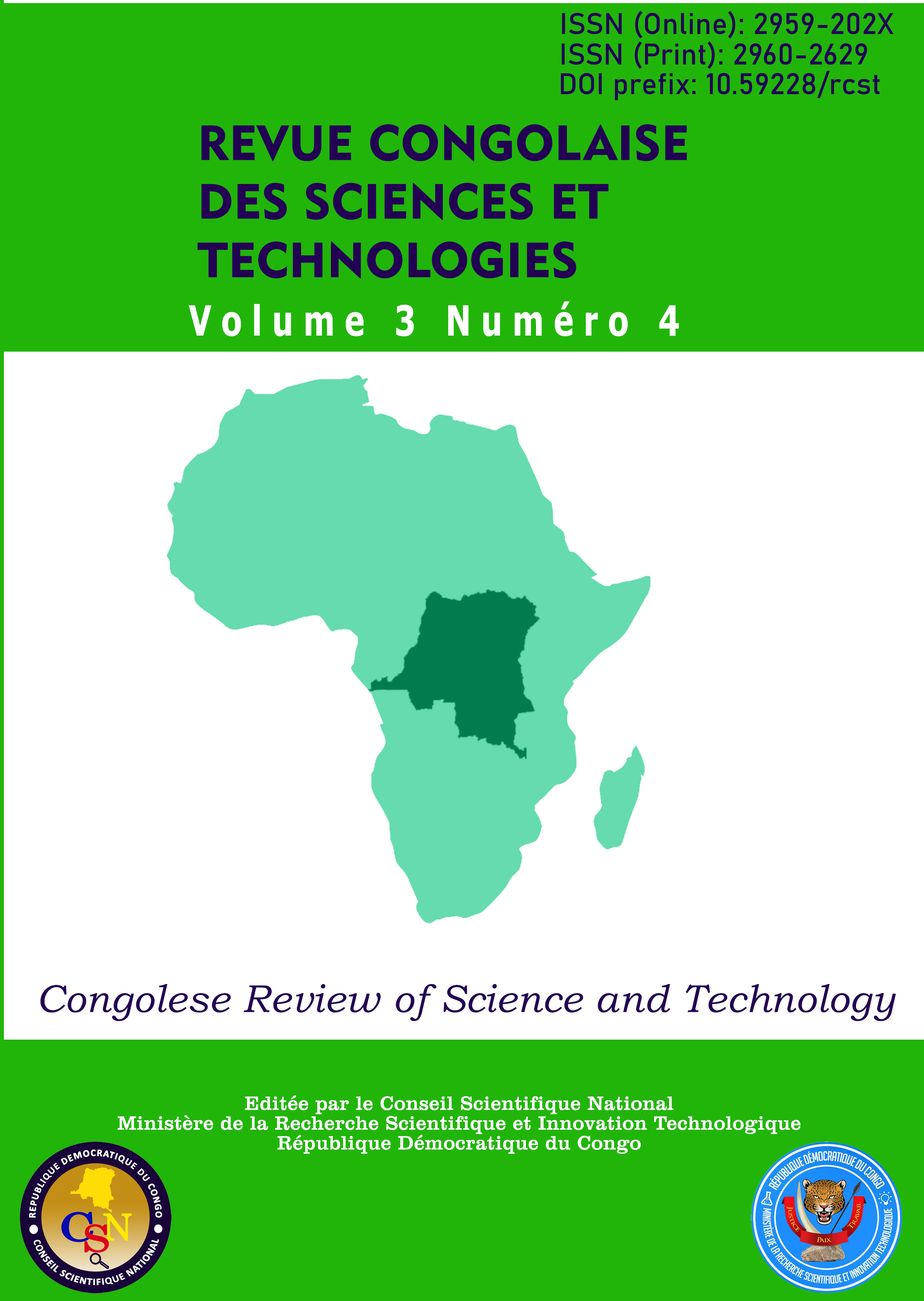Opinions of women benefiting from free maternity care as part of universal health coverage in the Democratic Republic of Congo: Case of Centre Hospitalier du Mont-Amba in the Lemba Health Zone, Kinshasa
Main Article Content
Abstract
Poverty is one of the main obstacles to access to obstetric care for Congolese women in the Democratic Republic of Congo (DRC), where maternal and neonatal mortality remains high. Within the framework of universal health coverage, the DRC has introduced a program of free maternity care, which aims to contribute to the reduction of maternal and neonatal mortality.
This exploratory qualitative study was carried out to gather the opinions of women benefiting from free maternity care, using semi-structured interview methods and an audio recording technique based on an interview guide. The data were analyzed using a thematic approach, with categories and sub-themes developed from the participants' verbatim.
Keywords : Opinions, free maternity care, universal health coverage, Democratic Republic of Congo.
Article Details
Section

This work is licensed under a Creative Commons Attribution-NonCommercial-ShareAlike 4.0 International License.
References
Abredu, J., Alipito, B., Dwumfour, C.K., Witter, S., Dzomeku, V.M. (2023). Factors influencing the free maternal health care policy under the national health insurance scheme’s provision for skilled delivery services in Ghana: a narrative literature review. BMC Pregnancy and Childbirth, 23(2),439–448. https://doi.org/10.1186/s12884-023-05730-2.
Bamfo, I., Sarfo, J.O., Ansah, E.W., Amoah, S.K. (2020). The impact of health on economic development: Ghana's COVID-19 management so far. European Journal of Economic Studies, 9(1), 3–10. DOI: https://doi.org/10.13187/es.2020.1.3.
Bohren, M.A., Mehrtash, H., Fawole, B., Maung, T.M., et al. (2019). How women are treated during facility-based childbirth in four countries: a cross-sectional study with labour observations and community-based surveys. The Lancet, 394(10210), 1750–1763. DOI: 10.1016/S0140-6736(19)31992-0.
Geremia, S., Valente, E.P., Mariani, I., Dalena, P., Lazzerini, M. (2023). Women’s suggestions on how to improve the quality of maternal and newborn care during the COVID-19 pandemic in Italy: A co-occurrence network analysis. Journal of Global Health, 13(2), 6013-6020. DOI: 10.7189/jogh.13.06013.
Goyet, S., Broch-Alvarez, V., Becker, C. (2019). Quality improvement in maternal and newborn healthcare: lessons from programmes supported by the German development organisation in Africa and Asia. BMJ Global Health, 4(5), e001562. https://doi.org/10.1136/bmjgh-2019-001562.
Hodgins, S. (2013). Achieving better maternal and newborn outcomes: coherent strategy and pragmatic, tailored implementation. Global Health: Science and Practice, 1(2), 146–153. Doi: 10.9745/GHSP-D-13-00030.
Jahan, N.A., Sultana, N., Bhuiyan, S.M., Ishaq, F. (2024). Universal Health Coverage in Bangladesh: Challenges and Prospects. The Dhaka University Journal of Earth and Environmental Sciences, 6, 1–13.
Kahindo, J.B. M., Mitangala, N.P., Nguemeleu, E.T., Nzanzu, M. (2023). Issues and challenges of universal health coverage in the Democratic Republic of Congo: A critical interpretative synthesis of the literature. Innovative Space of Scientific Research Journals, 66(1) ,42–56.
Kinenkinda, X., Mukuku, O., Chenge, F., Kakudji, P., Banzulu, P. (2017). Risk factors for maternal and perinatal mortality among women undergoing cesarean section in Lubumbashi, Democratic Republic of Congo. The Pan African Medical Journal, 26(4), 208–220. DOI:10.11604/pamj.2017.26.208.12148.
Kruk, M. E., Gage, A.D., Arsenault, C., Jordan, K., Leslie, H.H. (2018). High-quality health systems in the Sustainable Development Goals era: time for a revolution. Lancet Global Health, 6(11), e1196-e1252. DOI: 10.1016/S2214-109X(18)30386-3.
Lozano, R., Fullman, N., Mumford, J.E., Knight, M., Barthelemy, C.M. (2020). Measuring universal health coverage based on an index of effective coverage of health services in 204 countries and territories, 1990–2019: a systematic analysis for the Global Burden of Disease Study 2019. The Lancet,88, 1–35. https://doi.org/10.1016/S0140-6736(20)30750-9.
Maleya, A., Kakudji, Y.K., Mwazaz, R.M. (2019). Issues materno-foetales des grossesses non suivies à Lubumbashi, République Démocratique du Congo. The Pan African Medical Journal, 33(3), 66–81. Doi:10.11604/pamj.2019.33.66.18528.
McFadden, A., Gupta, S., Marshall, J.L, Shinwell, S. et al. (2020). Systematic review of barriers to, and facilitators of, the provision of high-quality midwifery services in India. Birth Issues in Perinatal Care, 47(4), 304–321. https://doi.org/10.1111/birt.12498.
Olaniran, A., Briggs, J., Pradhan, A., Bogue, E., Schreiber, B. et al. (2022). Stock-outs of essential medicines among community health workers (CHWs) in low- and middle-income countries (LMICs): a systematic literature review of the extent, reasons, and consequences. Human Resources for Health, 20(1), 58–67. DOI: 10.1186/s12960-022-00755-8.
Schmidt, H., Gostin, L.O., Emanuel, E.J. (2015). Public health, universal health coverage, and Sustainable Development Goals: can they coexist? The Lancet, 386(9996):928-30. DOI: 10.1016/S0140-6736(15)60244-6.

